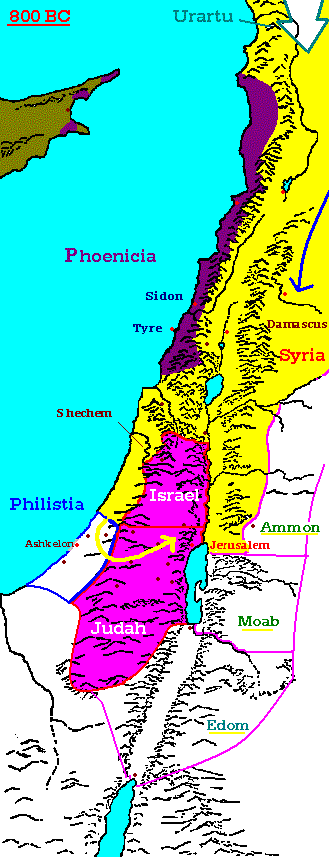Prepare Ye the Way
800 - 700 BC, the Holy Land
800 - 700 BC, the Holy Land
 Syria had been mortally wounded by the Assyrian attacks.
After the forays of Hazael, its strength began to ebb.
Joash of Israel seized the advantage and retook his lands.
In the south, Judah re-established its rule over Edom and endeavored to separate itself from alliance as an unequal partner with Israel.
Punishment was swift; Joash took Jerusalem and the Temple was sacked once again.
Syria had been mortally wounded by the Assyrian attacks.
After the forays of Hazael, its strength began to ebb.
Joash of Israel seized the advantage and retook his lands.
In the south, Judah re-established its rule over Edom and endeavored to separate itself from alliance as an unequal partner with Israel.
Punishment was swift; Joash took Jerusalem and the Temple was sacked once again.
The voice of the prophets was heard again in the land. Amos was the first of a new group of men who spoke against the encroaching idolatry and injustice. A new theme was predominant in their teachings: God is far more concerned with righteousness than ritual.
King Jeroboam II entered Syria itself and made the proud Kingdom of Damascus once again tributary to Israel. In mid-century the area of the old Israel-Judah was controlled by Jeroboam II; the empire was a reflection of the old Davidic kingdom.
It soon became apparent that this empire was a mirage. In 745 BC, a strong ruler came to the throne of Assyria - Pul, or Tiglath-Pileser III. The new King of Israel, Menahem, and his son were swift to accord him tribute. This gesture enraged the nationalistic prophetic groups and they brought another dynasty into power. This king, Pekah, allied with Syria to face the Assyrian monster. Judah quite resonably refused to join such a suicidal endeavor and was beseiged by the new partners. In desperation, King Ahaz appealed to Assyria. Tiglath-Pileser III was delighted to help; he took Syria once and for all, as well as a good part of Israel, making that kingdom his tributary.
The last King of Israel, Hoshea, tried an abortive rebellion against Tiglath-Pileser's successor. It failed, but the moment the Assyrians wer occupied elsewhere, he rebelled again, egged on by Egypt, which wanted the small states as a buffer against the greedy northern empire.
This spelled the end of Israel. Sargon II took Samaria in 722. Instead of simply controlling an area by terrorism, Assyria had developed a more civilized policy of resettling huge population groups in distant places. Thousands of Israelites, including the leaders, artisans and skilled workers were sent away into the land of Haran from which their ancestors had come. There, bereft of country and heritage, they disappeared from history. Their homeland was given to people displaced from other Assyrian provinces.
Judah existed quietly under Hezekiah until Sargon II died; then it joined a rebellion against Assyria. In 701, the armies of Sargon's son Sennecherib turned south into the tiny kingdom.
Posted by John  Read more
Read more  Comments (15)
Comments (15) ![]() 17.01.
17.01.